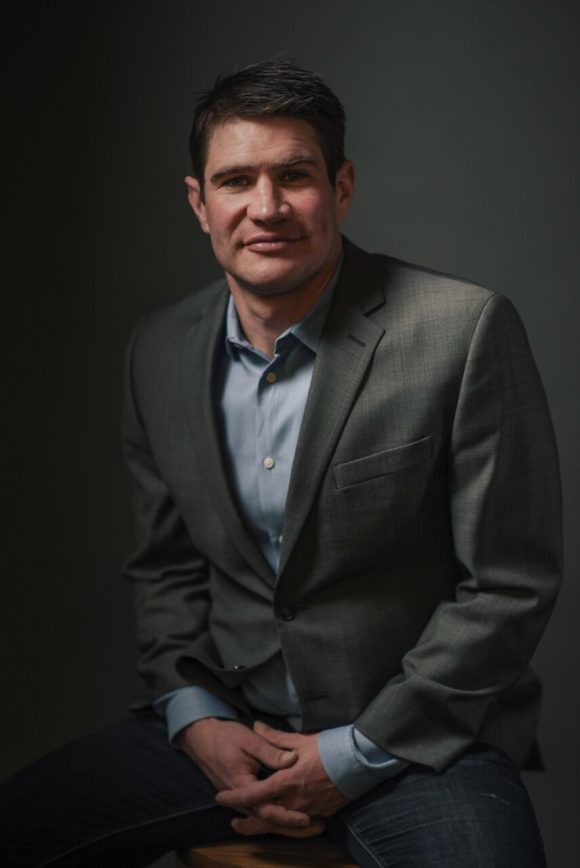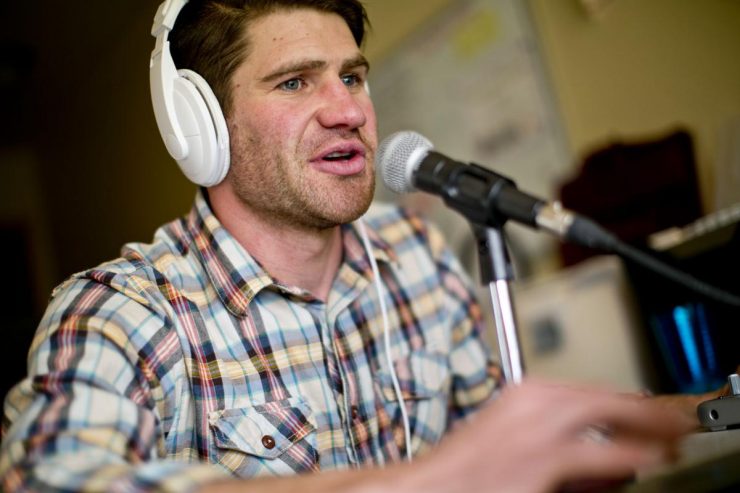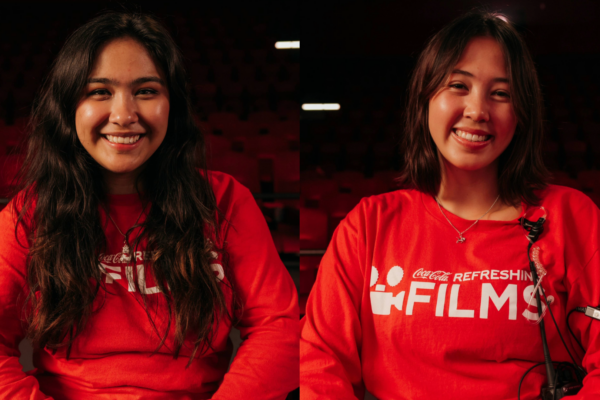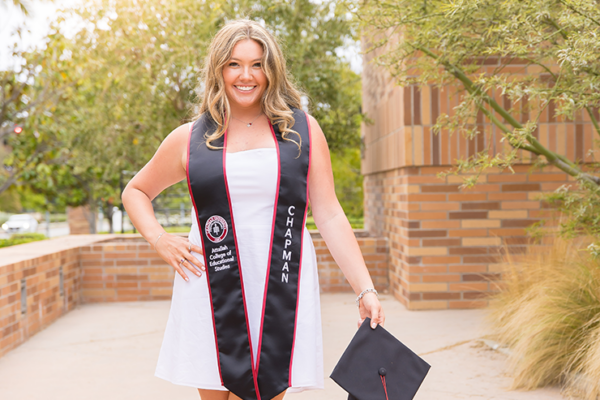When Paul Churchill ’05 sits down alone behind a microphone in Bozeman, Montana, a community starts to come alive.
My name is Paul Churchill and I have a confession to make. I’m 32 years old, I live in southwest Montana. I share my condo with a Standard Poodle named Ben. And here’s the confession. In reality, I’m terrified to say this. And I’ve known this for a fact, what I’m about to say, for 10 years, but every time I say it, I’m still getting used to it. It stings. It’s something I’ve held hidden, deep dark inside my realm of secrets. But here it is: I am an alcoholic. I have been sober for 156 days.
Those are the words that launched the Recovery Elevator podcast when it first aired on Feb. 12, 2015.
More than 2 million downloads and 200-plus weekly episodes later, Churchill is more than four years sober and Recovery Elevator is an entrepreneurial success that embraces technology as a way to create communities that help people learn to live a life without alcohol.
“I think I’m going to do Recovery Elevator for the rest of my life,” he said. “I love it. It’s a lot of fun.”
A Different Approach
What began as a way to try to carry himself through the challenges of his first year of sobriety has evolved into a multifaceted business. The podcast has attracted multiple corporate sponsors, and Recovery Elevator offers listeners paid subscription-based access to private online communities known as Café RE, along with “sober travel” group tours, including a fall trip to Peru.
As the audience grew, Churchill realized his mission had become to “shred the shame” caused by the stigma surrounding substance use disorders, and to help people manage a life without drinking by creating connections with others.
If there are so many people struggling, why are we so secretive? — Paul Churchill
Excessive alcohol use leads to about 88,000 U.S. deaths each year and is involved in almost a third of driving fatalities. An estimated 15 million American adults have an alcohol use disorder, but fewer than 10 percent receive treatment in a given year.
“Alcohol does not discriminate,” said Churchill, whose weekly podcasts now include a listener each week who wants to share their story. “I’ve interviewed doctors, lawyers, engineers, even the CEO of a Fortune 500 company.”
What Churchill inadvertently discovered is how technology can ease the path to sobriety.
Taking a first anxious step into an Alcoholics Anonymous meeting or committing to a rehab program can be frightening. But by listening privately at first, then signing up for a private Facebook group or going onto the podcast as a guest, people often find they become comfortable enough to be more open in their journeys and many times eventually find their way to AA or treatment if they need additional support, Churchill says.
The listeners on Churchill’s warm, witty and bantering podcast — be prepared for occasional references to the band Third Eye Blind — are not who some people might expect them to be. They are mostly in their 20s, 30s and 40s. Many are in relationships or are the parents of young children. Most are doing well in their careers, though many have had personal or work setbacks at some point. But whether Churchill is talking to Elaine with 15 days sober or Ronnie with 25 years, his refrain is the same: “We can’t do this alone.”
An Entrepreneur at Heart
At Chapman, Churchill majored in business administration with a minor in Spanish, and knew he wanted to become an entrepreneur. Also a member of the football team, he was often the life of the party, but not in the way you might think.
“I was always DJ’ing at Chapman. I would be on the microphone and just felt comfortable,” he said. “It’s kind of a God-given talent.”

Starting his own businesses was always in the cards — “That’s just how I’m wired. I was the kid that had lemonade stands,” he said — and he took advantage of opportunities to learn outside of class, even going to lunch with some of his instructors.
“I loved at Chapman that I could go talk to any one of my professors. I took advantage of the office hours, and it was a small school. That’s what they sold, and that’s what they delivered. They delivered a personalized education.”
Churchill’s current roster of successful businesses includes a thriving wedding DJ company, adult sports leagues and an arcade business. But it was his first venture, buying and operating a bar in Spain, that set him on a harrowing path that ultimately led to sobriety, or what he calls “my most crowning achievement in life.”
“When I graduated Chapman, becoming an alcoholic was not part of the plan, but you’ve got to roll with the punches,” Churchill said wryly.
His story, which he has told at speaking engagements like TEDx Bozeman, has dark turns, like many stories of addiction.
“I was hoping to leave my drinking problem in Spain, that it would stay there, but guess what? It came with me when I moved back home to Colorado. From there, I actually tried another geographical cure, I went from Colorado to grad school at the University of Washington, hoping my drinking problem was going to stay in Colorado, but darn it, it came with me to Washington. In 2010, I started to realize alcohol might be the problem,” he said.
“I had been a success as an entrepreneur, and pretty much everything I’ve done, but something was holding me back, and in 2010 I decided to quit drinking, and I made it 2½ years, and then I drank again,” he said.
Churchill moved to Bozeman after earning a master’s degree in intercollegiate leadership at Washington, launched more businesses, and stopped drinking for what he intends to be the final time on Sept. 7, 2014.
In those early, shaky months, “I kind of had a moment of clarity, like oh my gosh, if I don’t do something extremely different, I am going to drink again and all these businesses that I built, they’re all going to come tumbling down,” Churchill said. “The signs were there. It was already starting to happen.”
The podcast started simply as a way to hold himself accountable, he said.
“I didn’t really care who listened. I literally had no intentions of turning it into a business and turning it into what it is today. But I slowly started checking download numbers and people were listening. Then I got a first email and then a second email. Then about 100 episodes in, ZipRecruiter sponsored it, and now we’re getting more and more.”
A Continuing Quest
Though Churchill attends meetings of Alcoholics Anonymous, the organization founded in 1935 that established the “12-step method,” his approach is that people should find whatever works for them. His exploration of recovery continues, with well-researched introductions on the podcast to topics such as medication-assisted treatment, the relationship between alcohol and anxiety, and post-acute withdrawal syndrome, which includes symptoms such as anxiety, depression or difficulty concentrating that can persist many months into abstinence. He discusses mindfulness, how to date in sobriety and how to stay sober during the holidays. He even talks about whether to “break up” with the word alcoholic. (The current edition of the Diagnostic and Statistical Manual prepared by the American Psychiatric Association uses the term “alcohol use disorder.”)
With no formal training, Churchill is quick to say he doesn’t give treatment advice and is not an addiction counselor.
“It took me a while to figure this out, but the product I’m providing is community,” he said. “I bring a lot of like-minded people together in one place.”
Every time he talks about recovery, whether it’s on the podcast, in an interview or in day-to-day life, he knows there is a chance someone will recognize themselves.
“Even in college, there will be people at Chapman who say, ‘Oh my gosh, I need help,’” he said.
“Somebody’s going to read this, and I want to get the point across that they’re not alone. If you’re struggling with alcohol, you’re not alone and feel free to reach out to myself or just tell yourself, ‘I’m not alone.’ There’s a lot of people going through this, and we harbor this secret. I know for me, it was my deepest, darkest secret for about a decade. Just coming out about it was so empowering.”
Resources at Chapman for students concerned about alcohol or drug use can be found through Student Health Services and P.E.E.R. (Proactive Education Encouraging Responsibility). There also is a student AA organization on campus called the Bill W Group — contact the office of the Dean of Students for information — in addition to area AA meetings.




